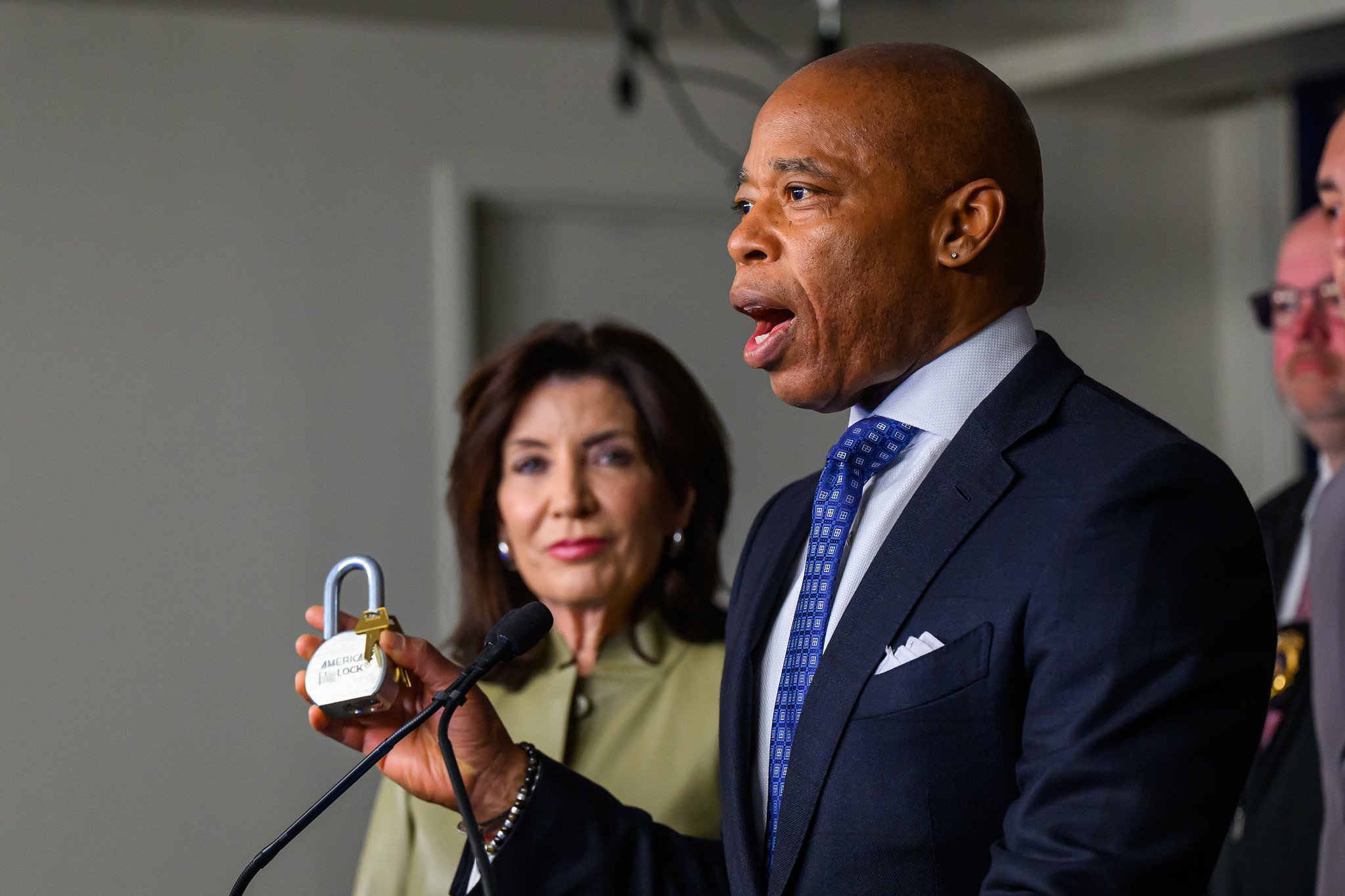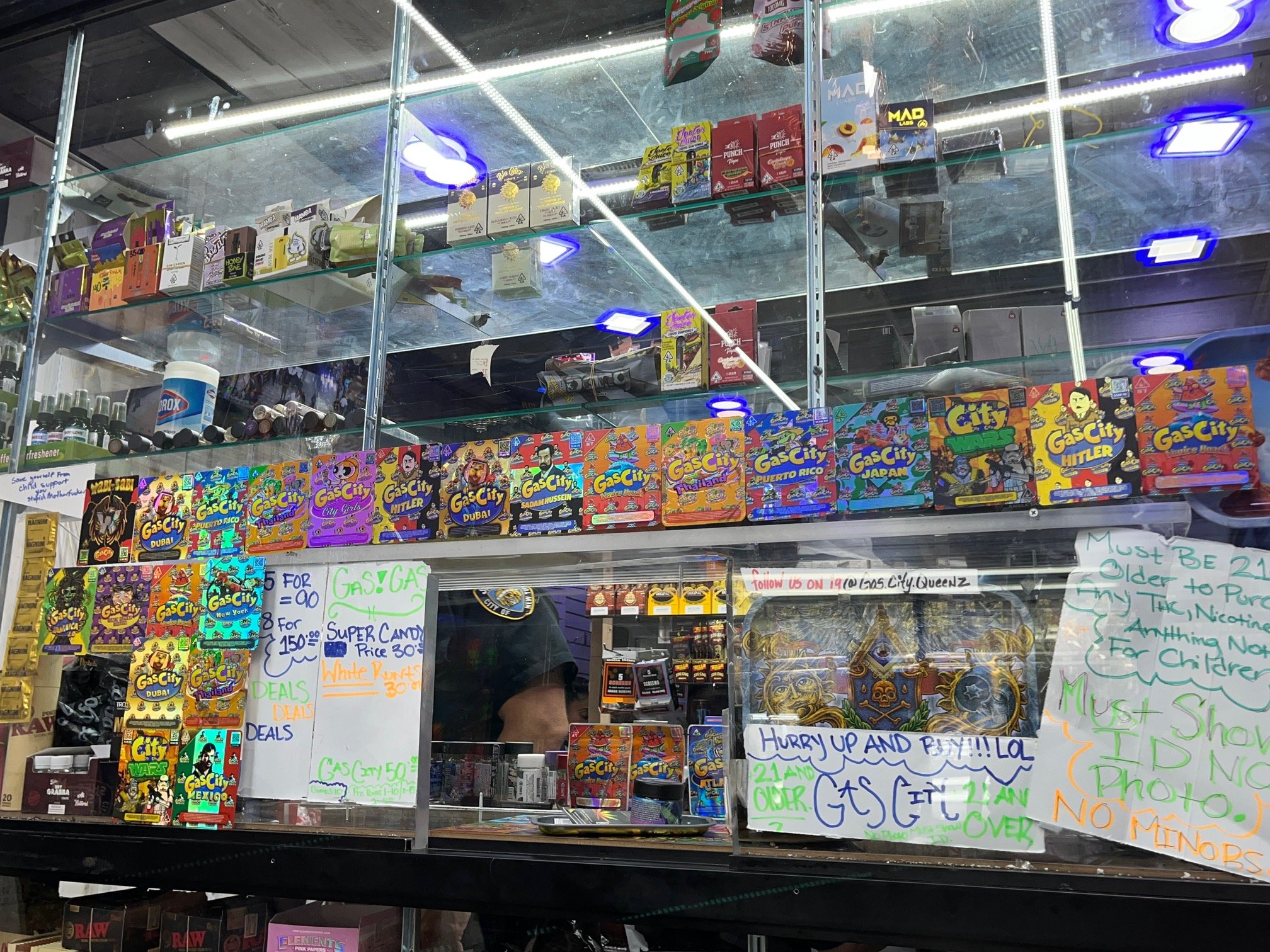City gets power to padlock illicit pot shops
/Included in the state’s budget is a bill that will grant New York City and other municipalities the ability to enforce illegal cannabis sales. Photo by Susan Watts/Office of Governor Kathy Hochul
By Ryan Schwach
After months of calls for more power in policing illegal smoke shops, city officials finally got their wish by way of the state budget.
As soon as the budget law can be implemented, New York City will begin bringing the NYPD into the illegal smoke shop enforcement fold, and other state municipalities will be able to pass new laws to shutter shops as well.
“We've waited far too long for this reckoning with all the illegal shops, and your day has come,” Governor Kathy Hochul said on Friday. “I'm using the power of the state budget to give us the tools we need at the state and local level to shutter these illegal shops once and for all.”
For New York City, the bill will specifically amend the New York City Administrative Code, which allows the city to act almost immediately.
“Here in New York City, have no doubt that enforcement will start immediately, marshaling the power of the New York City Sheriff's Office,” said Hochul. “They'll be able to ramp up enforcement and to add even more resources to this. The Sheriff's Office can then deputize the NYPD to help with these enforcement efforts.”
City Hall confirmed that the NYPD will be deputized to take on enforcement, a process that will begin once the budget is wrapped up.
“These measures, combined with already robust enforcement efforts will help keep the playing field level and push back against the quality of life issues that have resulted from the proliferation of illegal storefronts that really have become far too common in our city,” Adams said.
The amendment will allow the city to inspect, issue violations, seize cannabis and padlock stores.
The governor’s office also said that New York City will be able to conduct administrative hearings within five days of padlocking a store and will be provided with a decision within four days after the hearing.
“The padlock goes on immediately,” Hochul said.
Mayor Eric Adams, who has long supported the measures granted through the amendment, has said in the past that with such a law, he could shutter every illegal shop in 30 days.
“This is your warning, you will be locked out if you attempt to continue to sell illegal items,” he said to operators of illegal smoke shops. “This is a great moment for our city as we identify the problem and effectively use the government to put the tools in place for us to address the problem.”
For more than a year, the proliferation of illegal shops has been a hot button issue across the city, from elected officials down to Community Boards, who have tried to push back on them opening on local streets.
Officials and locals have pushed back on illegal shops owners – and on Friday Hochul called them “rampant bad actors”
“People who run these illicit shops engage in fraudulent advertising about what's in their products, because they don't really care about your health,” she said. “They'll source their product from anywhere because they don't care about New York farmers, they'll sell cannabis gummy rings, ice cream cones, chocolate bars, because they don't care about your kids, and they will evade taxes because they don't care about the communities where they operate.”
Both Hochul and Adams pushed back on the premise that expanding enforcement would bring back the overzealous and often racist cannabis policing measures practiced before legalization.
“They're misguided [if] they think that somehow this is going to return us to the bad old days of mass incarceration of people of color,” Hochul said. “Nothing could be further from the truth.”
“This is not a step backwards,” echoed Adams. “This is a step forward to ensure we have legalized cannabis shops.”
The budget bill also includes measures that would strip other licenses – like for tobacco, liquor and lotteries – away from businesses who engage in the sale of illegal products.
A new state law will be approved that will allow New York City to expand enforcement of illegal cannabis shops across the five boroughs. Eagle file photo by Ryan Schwach
It also creates a statewide task force to carry out civil enforcement to close illegal stores by going after suppliers.
The calls for local enforcement powers have been loud from many elected officials, including Queens elected officials like Councilmembers Lynn Schulman and Joann Ariola, as well as state officials like Assemblymember Jenifer Rajkumar.
Rajkumar, an Adams ally who represents Central Queens in Albany, has made going after the proliferation of illegal smoke shops a major priority.
On the first day if the new legislative session in January, Rajkumar introduced the aptly named SMOKEOUT (Stop Marijuana Overproliferation and Keep Empty Operators of Unlicensed Transactions) Act, which would essentially give state municipalities like NYC the ability to create their own cannabis enforcement.
Rajkumar pushed the bill heavily, with the backing of Adams, and applauded the budget measure this week – which is separate but similar in some ways to the bill she introduced.
“The SMOKEOUT Act calls for local control and for the power to shut down shops to be put in the hands of the cities and municipalities,” she said in a Thursday statement. “I am proud to say that New York City and all localities will now have the power to shut down illegal cannabis shops on their own, without waiting for the State Office of Cannabis Management. In New York City, the Office of the Sheriff will now be able to deputize the NYPD and all agencies to help padlock the shops. This means New York City can use its full manpower to get the job done.”
However, state officials clarified to the Eagle that although the bill in the final budget and Rajkumar’s SMOKEOUT Act have similar goals, the final budget bill is not SMOKEOUT and contains differing legislative language.
Rajkumar nor her bill were mentioned at Hochul and Adams’ joint press conference Friday. Her office said Rajkumar was still on the Assembly floor completing the budget and could not attend, although her chief of staff was present.
“The governor’s original draft budget did not include all of the provisions of SMOKEOUT Act,” Rajkumar’s chief of staff Vjola Isufaj said when asked about the discrepancy. “But after SMOKEOUT Act gained support in Albany, the full provisions of SMOKEOUT were put into the final budget.”
Regardless of exactly what bill – or who’s bill – is being enacted, the governor says the measure is a solid step in what will still be a long process toward getting the state’s cannabis market under control.
“We have a lot of catch up to do,” she said. “The illegal shops will not disappear overnight. But New Yorkers eventually will see a change in their communities, and that's what we're looking for.”





